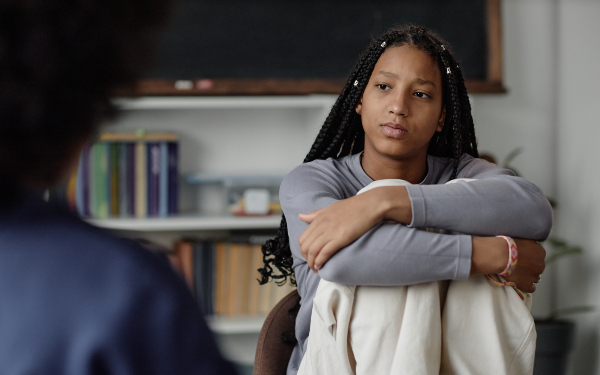
Thousands of vulnerable children risk losing access to vital therapy with the Adoption and Special Guardianship Support Fund (ASGSF) set to expire at the end of this month.
That was the claim from psychological support providers in a statement that warned that the breaks in therapy that many children now faced risked deepening their trauma and undermining placement stability.
ASGSF therapy funding lasts for up to 12 months, or when the typical £5,000 limit has expired, and local authorities and regional adoption agencies (RAA) must reapply each year to continue support for children and families.
In 2023-24, 16,970 therapy applications were approved for services including creative and physical therapies, family therapy, psychotherapy, parent training and therapeutic life story work.
‘Too late’ to apply for funding
However, with no Department for Education (DfE) funding committed beyond 31 March 2025, such applications can only be made for services starting or renewing before the end of this month.
According to charity Adoption UK, it is already too late to make an application before the deadline, meaning many existing services are set to stop even if DfE funding is announced for 2025-26.
Last week’s statement was issued by six therapy providers: Anna Freud in London, Beacon House (West Sussex), Family Futures (London), The Family Place (the Midlands and Devon), Gateway Psychology (Staffordshire) and TouchBase (East Sussex).
They said the AGSCF had been “crucial” in helping adopted children and those who left care under a special guardianship order (SGO) recover from trauma, neglect and abuse.
‘Emotional toll of uncertainty is immense’
“Trauma recovery work is all about facilitating safety, security and stability, “said Louise Michelle Bombèr, founding director of TouchBase.
“We are being prevented from providing this with breaks in therapy now expected. The families we work with are committed to their children but gravely concerned about the impact this break will have upon mental health and wellbeing.”
Jay Vaughan, chief executive and co-founder of Family Futures, added: “Our experience demonstrates that delays in therapy have a direct and detrimental impact on the safety and stability of adoptive and special guardianship placements, placing the children we support at significant risk.
“The emotional toll of this uncertainty is immense. Our families are experiencing a significant and unnecessary increase in stress and worry, exacerbating their already stressful home lives which will have long-lasting consequences for their wellbeing.”
They urged the government to confirm funding arrangements for the ASGSF for April 2025 onwards.
‘Most families set to lose support’
Separately, Surrey-based occupational therapy provider The Sensory Smart Child Ltd said that just 18 of the 123 children it supports through ASGSF funding had support confirmed beyond April 2025.
In an open letter to education secretary Bridget Phillipson, children’s minister Janet Daby and local MPs, its director, Karen Garner, said: “This means that 105 families are now in limbo, fearing the devastating impact that a sudden loss of support will have on their children’s progress, wellbeing and stability.
“This uncertainty is unsettling for everyone—the families who do not yet know if they will have access to funding beyond March, the children who we need to prepare to avoid an abrupt end to their therapy, and the therapists who dedicate themselves wholeheartedly to supporting these young people.”
She called for an “immediate and clear update on the status of this funding”, warning that “families cannot wait any longer”.
ASGSF support ‘a lifeline’
Adoption UK has also issued an open letter to Phillipson, which delivered a similar message.
Chief executive Emily Frith said the charity was receiving an increasing number of calls and emails from families worried about their children’s futures should therapy cease.
She quoted one family as describing the fund as a “lifeline” in supporting their adopted daughter, with their placement on the verge of breakdown.
“If the ASGSF was to discontinue it would have very serious repercussions for our family – and in the end would cost the government thousands of pounds more when we can no longer look after her at home,” the family said.
Urging Phillipson to confirm future ASGSF funding “without further delay”, Frith added: “There is a significant economic imperative in investing in therapeutic support as well as a moral one. There should be no doubt the cost to the Treasury will be far greater if the number of adoptive families facing crises continues to rise.”
MPs raising questions about fund’s future
The concerns come with MPs increasingly raising the issue in Parliament.
In a response to a parliamentary question from fellow Labour MP Rachael Maskell, issued on 29 January 2025, children’s minister Janet Daby said a decision on the fund would be made “as soon as possible”.
“The department will shortly be finalising business planning decisions on how its budget will be allocated for the next financial year,” she said at the time. “All decisions regarding the Adoption and Special Guardianship Support Fund (ASGSF) are being made as part of these discussions. An announcement will be made as soon as possible.”
On 6 March, in a written response to three MPs’ questions about whether the fund should be made permanent or renewed, Daby referred them to the answer she gave on 29 January. On 7 March, she reiterated the statement from 29 January in response to a question from Liberal Democrat MP Freddie van Mierlo and referred his fellow Lib Dem Manuela Perteghella to her previous answer.
Research into ASGSF’s impact
Daby gave a fuller response, last week, to a question from Lib Dem MP Cameron Thomas on the DfE’s assessment of the impact of the ASGSF so far, along with whether funding would continue beyond March 2025.
Daby cited a DfE commissioned study from 2018-21, which found that most parents or guardians felt the support received through the fund had been helpful or very helpful and were positive about the extent to which positive changes had been sustained six months after services finished.
She added that the department had started collecting data on outcomes from ASGSF-funded therapies at the end of 2023, which would “give an overall picture of their impact and adequacy”.
However, in relation to future funding, Daby reiterated the line she gave on 29 January.






 Bournemouth, Christchurch and Poole
Bournemouth, Christchurch and Poole  Hampshire County Council
Hampshire County Council  Oxfordshire County Council
Oxfordshire County Council  South Gloucestershire Council
South Gloucestershire Council  Wokingham Borough Council
Wokingham Borough Council  Webinar: building a practice framework with the influence of practitioner voice
Webinar: building a practice framework with the influence of practitioner voice  ‘They don’t have to retell their story’: building long-lasting relationships with children and young people
‘They don’t have to retell their story’: building long-lasting relationships with children and young people  Podcast: returning to social work after becoming a first-time parent
Podcast: returning to social work after becoming a first-time parent  How managers are inspiring social workers to progress in their careers
How managers are inspiring social workers to progress in their careers  Workforce Insights – showcasing a selection of the sector’s top recruiters
Workforce Insights – showcasing a selection of the sector’s top recruiters 

 Facebook
Facebook X
X LinkedIn
LinkedIn Instagram
Instagram
Private companies which rely on public funded revenue streams lobbying for this to continue is not a surprise is it? The real question actually is if we were allowed to do proper social work with sustained relationships rather than used as glorified administrators of half baked bureaucratic targets, would we need “therapists”? Personally I rather see a realignment of proper social work values than yet another round of howling about funding for private companies.
Of course we would still need therapists. My daughter was severely neglected and abused for 4 years prior to coming into foster care and then adopted. Without the ASF we cant access therapy as ice had to stop working in order to care for my daughter
Totally agree with this! I’m an adoptive parent of 17 years and I am totally cynical about the ASGSF; it’s now a get-rich-quick scheme for ‘corporate’ therapy companies. I’d prefer for my adopted children to access fully qualified NHS psychotherapists via CAMHS rather than art/play/drama/music etc therapists who have had a few days of ‘training’. The ASF WAS a great idea but it was exploited by greedy therapy companies who all started to price their support packages at £5K. I would much rather see funding put in to save the Centre for Adoption and Fostering at the South London Maudsley Hospital, the only centre to offer evidence-based assessments and therapies for care-experienced children. It’s interesting that all of the organisations named in the article championing for a renewal of that ASGSF have received hundreds of referrals between them.
Hi AdoptiveMum. It is important to note that music therapists and other creative arts therapists do not have a few days ‘training.’ They are masters level qualified and have to be registered with the HCPC to work. Whilst it is OK to have an opinion on how work is funded, it is important not to spread ignorant mistruths which mislead.
Hi I’m not part of a big corporate company but a sole trader and accredited play therapist. To become a play or other therapist is three years of postgraduate training and 200 clinical hours. Additional training is required on top of that to work for the asf. The work I do enables children to process their traumatic experiences and move on from them. It supports families to stay together. I do not overcharge for my services and my costs are real. The lack of decision in this area is going to have a big impact
Here to back the creative therapists. For children without the mental or cognitive power to verbally process their trauma (i.e most of them), creative therapies are invaluable. Do we want those therapists to be qualified and experienced like Andrew and Liz, above? Of course. Do we want them to be paid adequately for their valued services? Also yes.
This is a misunderstanding the majority of people providing therapeutic services are small companies or sole traders providing an important specialist service to adoptive families. I’m making a living but certainly not making big profits
The Adoption Support Fund, as it was initially called, was very poorly conceived on inception. It was put forward by an ideological conservative led government with no real planning or preparation in order to help promote adoption as the gold standard for permanence. It quickly became evident that the government had no idea of the high level of need children with traumatic early histories would come forward to request support for. This potentially traumatic ending was baked in from the beginning with no consideration of how the fund would develop. This was exacerbated when the £5000 per year funding limit was imposed, at best purchasing half a year at a time. This inflicted yearly endings and restarts of broken cycles of therapy on extremely vulnerable children and held back development of relationships and therapeutic momentum for many. The government placed additional financial responsibilities and pressure on impoverished local authorities to either contribute extra funds, or otherwise take the blame for the inevitable disruptions to interventions. At the same time many local authorities’ own adoption support services became deskilled and underutilised. The overwhelming crises of trauma and adversity the same government inflicted on its own people, over more than a decade of austerity and class warfare, increased the complexity of children’s needs and removed essential core services and support. This has resulted in increasing numbers of families in crisis, including many adoptive families. The ASGSF has repeatedly been used as a sticking plaster to manage immediate parental crises and keep adopted children in their family homes, when the limited relationship focused therapies it funds need children to be provided with a good enough level of relational stability and security at home and at school to have any real impact on their developmental recovery. The ASGSF is referred to as a ‘life line’, when in many cases It simply delays the inevitable and masks significant dysfunction in family relationships which are then not unpacked and worked upon. The fund has also falsely hyperinflated a market of private therapy service providers of varying quality. Many of these services are excellent and with access to fairer, more robust funding streams would have huge beneficial impacts on children’s welfare and support the success of permanence placements of all kinds. Many providers are now largely financially dependent upon the fund for survival. It is not surprising that it is these same companies, with a vested interest in the survival of the fund, which are venerating it so highly. The Labour government has inherited this unreasonably exclusive, highly expensive but utterly insufficient funding stream and it has become misplaced and overlooked in its spending review process. It is obvious that the Adoption & Special Guardianship Support Fund needs overhauling and fundamental change, especially within the context of universal mental health services where other children with equal levels of need cannot access any support for their emotional or mental health. However, Labour is completely mishandling either the ending or the preferred reform of the fund, which might open up opportunities to children who have equal need but are either in care or living with their birth families. It is leaving children and families in deeper uncertainty, on the cliff edge of crisis, and is only compounding the damage which previous government policy has already caused.
Totally agree. Having worked in post adoption services and been horrified by the reality of the discrepancies and bureaucracy the fund has resulted in an overhaul is desperately needed.
We really need to let social workers do social work, but they are not trained therapists. I do not want them ‘having a go’ at sensory attachment, or even theraplay without proper training, accreditation and appropriately qualified supervision. The private sector does sone incredible work here. There are outstanding specialist providers out there who perhaps better contracts could be made to do things differently with?
If we let social workers actually do social work there would be fewer children and families referred to so claimed specialist therapy companies. Social workers aren’t therapists but it might come as a surprise that not every ‘therapist’ is a trained practitioner equipped to do the work companies claim they are doing either.
I’m an adopter of an 11 year old with a variety of complex needs. Our day starts and ends with screaming, jostling, and threats (other adopters have it much worse on the aggression/violence front).
I’m not quite sure how we keep going but we do.
One of the key planks of our sanity over the past year has been a great dyadic developmental (DDP) therapist employed by one of the private firms mentioned in this article.
Her experience, training and skills keep us just this side of sane, which means we are more likely to be able to do the same for our daughter.
Maybe the fund does need overhauling but don’t throw the baby out with the bathwater (unfortunate metaphor, admittedly). DDP works.
In our adopted family of two sibling brothers, our youngest 11 year old having more complex needs our DDP Therapist is my lifeline. The constant daily anxiety our youngest is in is heartbreaking and ‘love, patience, curiosity, acceptance and empathy does help but we are only human and abuse and threatening abuse is very hard to take. If I didn’t have DDP therapy it’s an extremely scary thought. Our family is now deemed as ‘in crisis’
There are skilful and dedicated workers in every part of the private sector as well as greedy charlatans – just as there are good and bad public sector workers. But in principle, serving the most vulnerable children should not be for profit – any more than policing or water.
Children need social workers and therapists who are properly trained, resourced and supported. They would be able to access the right help through local authorities and health if adequate funding was available. We need equal access to therapeutic support for all children, including those who are fostered, return or remain at home or are in any kind of kinship care, not just those on SGOs or in adoption. Ending austerity and increasing funding for preventative services would help keep more children safe at home and support new families better when this is not possible. We need to pay more tax if we want decent services.
Irrespective of if an overhaul is needed etc, it is the apparent stop and unknown start date of therapy that is difficult. My child took a while to attach to the OT and make progress. At the end of the funded sessions, she is asking when will I see her again? With a child like her it is difficult to say maybe we can if we get funding and if we do I don’t know how long until we see her. Time to worry about these things it looking at it middle of cycle rather than at the end of financial year
Another point I’d like to make is that adoption agencies are now themselves cashing in on the ASGSF by ‘training’ their own workers to offer courses such as theraplay and NVR (the new white elephant in the adoption room) and then charging to complete an assessment and then for delivering the courses to adopters.
I’m sad to hear this become a competition between social work and therapists. In our local authorities the social workers are just as anxious as we therapists are about the ASGSF as we work together as a team around families. I own and run one of these so-called corporate companies. I earn less running this than I ever did as a freelance therapist. The overheads in adoption support are huge because it’s a specialist area and so insurance alone is costly. I maintain it because the work we deliver is vital and rewarding. Our CIC also fundraisers for children who can’t access funded therapy. We do all this because we love the work, it isn’t a money maker. I agree with a number of points made – social workers are not therapists, but they definitely need to be able to do social work. I have massive respect for our social workers. Some organisations are getting away with not using fully qualified and registered therapists, which is totally wrong and doesn’t happen on my watch. Adopters and special guardians are caring for children who have been traumatised and without support many would not be able to maintain this long term without huge detriment to their own mental health and wellbeing. This wait is causing massive stress all round and preventing planning for families needing long term support.